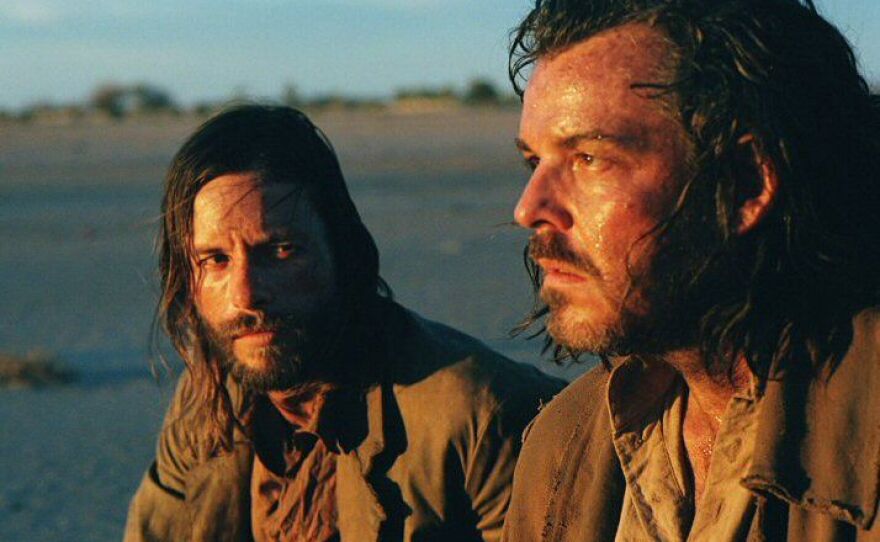Film actors Guy Pearce and Ray Winstone play men on opposite sides of the law in the new Australian western, "The Proposition" (opening May 19 at Landmark's Hillcrest Cinemas). But director, John Hillcoat, refuses to paint these characters in black and white. KPBS film critic Beth Accomando speaks with the filmmaker about making a western down under.
Captain Maurice Stanley is a British officer stationed in the harsh, untamed Australian outback of the 1880s.
STANLEY: Australia what fresh hell is this' I will civilize this place.
He's also intent on bringing justice to a lawless land. But that's not an easy task. Consider the Burns Brothers. The three siblings are wanted for murder but Captain Stanley knows that the eldest -- Arthur -- is the dangerous one. So when Stanley captures the younger brothers -- Charlie and Mikey -- he makes Charlie a proposition
STANLEY: Suppose Mr. Burns I were to give both you and your young brother Mikey a pardon. Suppose I said I'd give you a chance to expunge your guilt. Now suppose you tell me what I want from you.
CHARLIE: You want me to kill my brother.
STANLEY: I want you to kill you brother.
That's the proposition Stanley makes to Charlie. But director John Hillcoat has a proposition for the audience. Suppose he were to examine notions of civilization, and suppose he were to do so in a western about British colonization.
JOHN HILLCOAT: The film is about empire building and when empires try to export their own notion of civilization into worlds that are radically different in its culture and terrain' I think that the Victorians in Australia went to quite an extreme to conquer that land and call it civilized' Again it's like committing acts of violence that automatically morally compromise you or implicate you.
Stanley and Charlie are both morally compromised men. Stanley sheds blood in the name of justice, and Charlie could have stopped his brother from killing. Hillcoat sees the two men on surprisingly parallel journeys.
JOHN HILLCOAT: What they both have in common is that they are both trying to work out what is the right thing to do.
Charlie knows that whether the law demands it or not, his brother Arthur must be stopped. But doing the morally right thing is complicated by the fact that Arthur is his older brother and a man with a poetic sense of family.
ARTHUR: Love is the key. Love and family. For what are night and day, the sun the moon and the stars, without love and without those you love around you.
Hillcoat says that a lot of Australian outlaws were poor Irish convicts with a strong sense of family and a natural antagonism toward the British.
JOHN HILLCOAT: There was still a class war going on between the British and the poor Irish.
That war plays in a scene between Guy Pearce's Charlie and a British bounty hunter played by John Hurt.
CHARLIE: One more crack about the Irish Mr. Lamb and I'll shoot you, am I clear?
LAMB: As the waters of Innis. Let us drink to the Irish, no finer race of men have ever peeled a potato.
Creating a western that captures the unique flavor of Australia's history is important to Hillcoat and musician-writer Nick Cave. These Aussie natives wanted to show a terrain that during the day looks like an alien planet, inhospitable to human life. But at night, they find breathtakingly beautiful vistas. That harsh contrast also reflects the characters and the situations they face. Stanley wants to civilize the country but how can he do so when the supposedly civilized men 'British officials' are the ones calling for brutal floggings and the abuse of aborigines? Notions of civilization and morality get twisted in the vast outback but one thing Hillcoat sees clearly is that violence never solves anything.
JOHN HILLCOAT: It's something I believe very strongly violence basically compromises everyone, there are no victors. So we wanted to explore the aftermath of violence and I think that necessitates ambivalence and complexity in terms of whether someone's morally good or bad.
Navigating an ambiguous moral landscape is what "The Proposition" is all about. In that respect, it recalls such 70s westerns as "The Wild Bunch" and "McCabe and Mrs. Miller." It also shares a poetic sense of sadness with those films. But these period westerns also convey a modern sensibility. In "The Proposition," Hillcoat sees the cyclical nature of history, and the recurring use of violence to curb violence.
JOHN HILLCOAT: The ideals of civilization begin to sound a bit hollow when we can see the compromises that are really happening.
That's something that Hillcoat says has come to our doorstep again and he hopes people will recognize that in his film.
Companion viewing: "The Wild Bunch," "McCabe and Mrs. Miller," "Walkabout," "The Chant of Jimmie Blacksmith"






